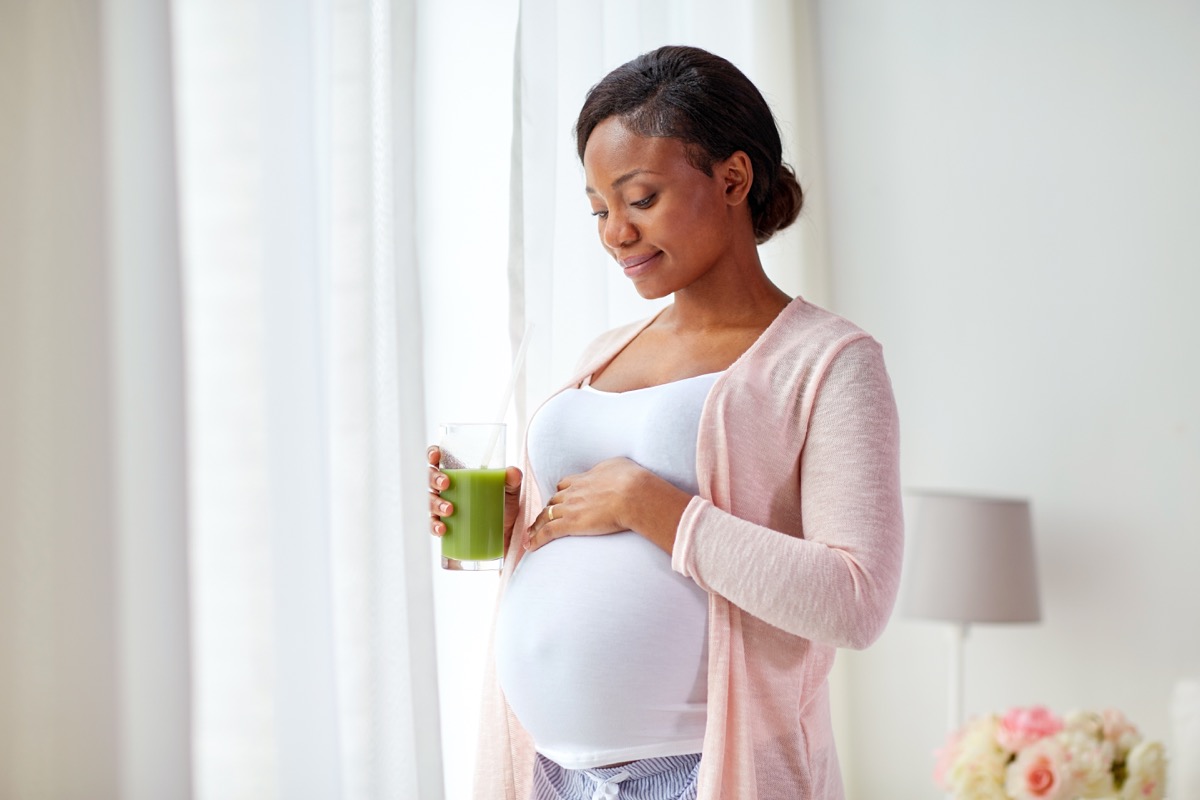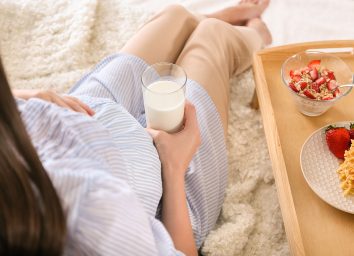The Best-Ever Foods to Eat During Pregnancy

Pregnancy is arguably one of the most special times in a woman's life. However, having a baby on board yields a lot of pressure when it comes to taking care of one's body for nine months. That said, many expectant mothers are passionate about making healthy choices for themselves and for their baby—and these changes usually start with diet.
Yes, women often find themselves making changes to their diets to ensure they're getting the proper nutrients needed for a healthy pregnancy, and in turn, a healthy baby. However, it's important to make sure women are educated about what they should be consuming during that important time…they are eating for two, after all!
To help pregnant women with this crucial knowledge, we checked in with nutritionist Amy Tao, MS, of Based Wellness, and Cynthia Lanzillotto, RD, to answer all your burning questions about going on a proper pregnancy diet and which are the best foods to eat while pregnant.
Here is a breakdown of the best foods for pregnancy and what diets are safe for pregnant women to still follow.
What foods should women eat while pregnant?
"Foods rich in folate, iron, iodine, calcium, vitamin D, and omega-3s are key during pregnancy," Tao says. In fact, according to a November 2017 study, a woman's need for folate increases by at least 50 percent during pregnancy, which is why it's important to consume folate through food and/or prenatal vitamins.
Folate helps with the synthesis of nucleic acid, which works to prevent neural tube defects in the developing fetus. The CDC recommends all women of reproductive age get 400 micrograms per day of folic acid. In addition, it's important to note the body cannot synthesize omega-3 and omega-6 fatty acids. Per a study, Tao noted "it's important that a pregnant woman is ingesting enough omega-3 and omega-6 fatty acids to transfer to her baby."
So what exactly are the best foods pregnant women should incorporate into their diets?
Spinach: Tao noted that just a 1/2 cup of cooked spinach contains 33 percent of your daily value of folate, which is a very sufficient amount for a pregnant woman. Spinach also contains a high dose of iron, in this case, 17 percent daily value for 1/2 cup.
Asparagus: Just four spears of asparagus contain 22 percent of the daily recommended value of folate, 15 percent daily value of iron, 10 percent daily value of potassium, 19 percent daily value of fiber, and 4 percent daily value of calcium, Tao says. A pure home run when it comes to nutrient intake for a pregnant woman, if you ask us!
Green Peas: A 1/2 cup of green peas contains a whopping 60 percent daily value of vitamin C, while also being rich in folate, protein, and fiber, Tao says.
Avocado: In addition to containing a hearty amount of folate and other important nutrients like potassium, vitamin C, and vitamin B6, a 1/2 cup of avocado also contains 20 percent daily value of fiber, Tao says. This significant source of fiber can also help promote regularity, as constipation is often an issue for pregnant women, Lanzillotto says.
Garbanzo Beans (Chickpeas): Instead of putting grilled chicken on your salad, try out garbanzo beans, which, Tao said, are packed with 7 grams of protein, as well as 11 percent daily value of iron, 25 percent daily value of fiber, and 4 percent daily value of calcium.
Lentils: Another great plant-based protein option, a 1/2 cup of lentils contains 17 percent daily value of iron, 10 percent daily value of vitamin C, 4 percent daily value of calcium, and 24 percent daily value of fiber, Tao says.
Plain Non-Fat Greek Yogurt: If you're looking for a healthy breakfast option, Tao says that a 3/4 cup serving of plain non-fat Greek yogurt yields 18 grams of protein and 15 percent daily value of calcium.
Oranges: To boost your vitamin intake, oranges are the answer, Tao says. One orange contains a whopping 116 percent daily value of vitamin C, as well as 10 percent daily value of folate, 12 percent daily value of fiber, and 5 percent daily value of calcium.
Salmon: Contrary to popular belief, per the American Pregnancy Association, it is OK for women to eat fish while pregnant, as long as it is low in mercury. Fish can contain omega-3 fatty acids, specifically DHA, Lanzillotto says. Salmon also contains high sources of vitamin D and protein. The FDA suggests eating approximately 8-12 ounces of a low mercury fish per week, and salmon is a low mercury fish, so dig on in.
Milk: Milk is a great source of calcium, Lanzilotto says. According to The American College of Obstetricians Gynecologists, adequate calcium is important for the growth of strong bones and teeth when expecting. The recommendation is 1,000 milligrams a day.
Eggs: Eggs contain choline, which is an important nutrient for early brain development in babies, one study notes. The National Institute of Health recommends 450 milligrams per day of choline for pregnant women.
Chia Seeds: Sensitive to lactose? Then chia seeds could be your answer! Chia seeds are a delicious non-dairy source of calcium that also contain omega-3s, protein, and iron, Lanzillotto says.
What lifestyle diets are OK to follow while pregnant?
In addition to incorporating certain foods into their everyday lives, some women may have questions about if following certain lifestyle diet plans that are typically designed for weight loss could have negative effects on their pregnancy. Both Tao and Lanzillotto recommend checking in with a nutritionist, registered dietitian, and/or your doctor before following any specific diet while pregnant. Here is a bit more detail on different diets during pregnancy.
Is it OK to follow the keto diet while pregnant?
Both Tao and Lanzillotto do not recommend doing the keto diet, which is a high-fat, moderate protein, and low carbohydrate concept, while pregnant.
"There is not enough research that has been done on the ketogenic diet in terms of safety or long-term effects on pregnancy," Tao says.
The main issue Lanzillotto finds with the keto diet though is the lack of certain nutrients.
"A lot of people who follow keto have to restrict their intake of grains, fruits, certain vegetables, and dairy products because these foods contain carbohydrates," she says. "You will be missing out on different nutrients that are found in these food groups and are essential for pregnancy." One study on low-carb diets in pregnant women also led to reduced fetal growth and low birth rate, so that is something to keep in mind, too.
Is a vegan or vegetarian diet OK to follow while pregnant?
A March 2019 study proves there are benefits of following a plant-based diet such as a vegan or vegetarian diet (a meatless and in some cases a fish and dairy-less diet). A vegetarian diet is also said to be adequate by the Academy of Nutrition & Dietetics.
"The key to safely executing a vegan diet during pregnancy is making sure that the person who is following the diet is aware that there may be nutrients that are lacking or hard to come by in a vegan diet," Tao says.
Going off of that, Lanzillotto says that "there are some nutrients to pay attention to during pregnancy, which include proteins, iron, vitamin D, calcium, omega-3s, and vitamin B12."
If a pregnant woman cannot obtain these vitamins through a vegetarian or vegan diet, a prenatal vitamin is always an option, after speaking to a doctor first.
Is it OK to follow a paleo diet while pregnant?
Similar to other restrictive diets, there has not been much research on the paleo diet and pregnant women. However, the "caveman diet," as it's referred to, includes foods that were traditionally gathered and/or hunted, such as meat, fish, poultry, eggs, vegetables, fruits, and berries. The diet says no to grains, dairy, legumes, sugar, and salt. That said, Lanzillotto does not advise a paleo diet without speaking to a registered dietitian or nutritionist who can ensure one is meeting their increased nutrient needs during pregnancy.
"The risk of eliminating entire food groups is that one may be missing out on different vitamins and minerals," she says. In fact, a study published in Hypertension found that women who increased their intake of meat and fish—as the paleo diet suggests—while pregnant had children with systolic blood pressure later in life.
What about intermittent fasting—is it OK to follow while pregnant?
Like the diets discussed prior, there has also not been a lot of research around intermittent fasting and pregnant women. That said, both Tao and Lanzillotto agree that pregnant women should stay away from the diet.
"Intermittent fasting has grown in popularity for helping with weight reduction by allowing for insulin levels to drop and therefore weight to be lost when the body then begins to burn fat," Tao says. "During pregnancy, it makes sense to eat more regularly to stabilize blood sugar levels rather than to create more confusion about insulin for a pregnant woman's body by practicing intermittent fasting."
Another reason pregnancy is not the time for intermittent fasting is that common side effects of pregnancy include both acid reflux and nausea. "A way to manage these symptoms is instead of having big meals, incorporate smaller, more frequent meals throughout the day. This could be difficult to follow while intermittent fasting," Lanzillotto says.
If you're working out, can you drink protein shakes while pregnant?
Both Tao and Lanzillotto recommend checking in with your doctor, nutritionist, and/or pharmacist before drinking any type of protein shake or taking supplements when you're expecting.
"It is absolutely possible to get too much of a certain micronutrient, even though our bodies need them and many come from natural sources. Depending on what the protein shake is fortified with, what prenatal vitamins or other supplements the expectant mother is taking, and what her diet is like, she could be overdoing it," Tao says. "Because nutritional supplements are so unregulated and because they are nutrients our bodies need, many people overlook the fact that ingesting doses above the recommended limits can be toxic and also forget that these supplements may interact with one another and with prescription medications."
Instead of drinking a protein shake, it could be safer to just ingest protein through your diet.
"If you are working out during pregnancy, I would recommend [incorporating] foods with protein first," Lanzillotto says. "Lean protein sources in the diet include meat, poultry, fish, eggs, beans and peas, peanut butter, soy products, and nuts."
All in all, it's important to be in tune with your body and health while pregnant, especially when it comes to your diet. However, if you're unsure about what foods to eat or if a certain restrictive diet is right for you, always check in with an expert first before making any drastic changes.








